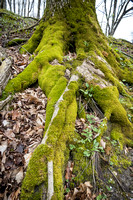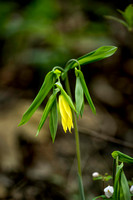DNR Description & Location: https://www.dnr.state.mn.us/snas/detail.html?id=sna01062
Prairie Creek Woods SNA is located approximately 55 miles south and east from Minneapolis; south of Northfield and north of Nerstrand, MN.
About:
This SNA is about the survival of a species. The dwarf trout lily's natural range is limited to a 200 square-mile area in Minnesota, where isolated colonies are found occurring on roughly 600 acres scattered across two watersheds. One of those places is here.
The dwarf trout lily is federally endangered and one of only a few species endemic (native and restricted) to Minnesota, believed to have originated in the Faribault area after a glacial retreat 13,000 years ago. This rare lily is only visible for about two months of the year. In early spring, first mottled leaves and then the slender, bud-tipped flower stalks rise from underground stems. During a 2-week blooming period, the dime-sized, white to pink flowers close each night and reopen each day. By summer even the leaves have fallen away, decomposing in the litter of the forest floor.
The site lies adjacent to Nerstrand Big Woods State Park on the park’s northern border. From the designated parking area, cross a restored prairie to reach the SNA boundary, where the land drops into a broad, forested ravine that follows the course of an intermittent stream. Rock outcroppings dot the ridgeline beneath a mature forest of sugar maple, basswood and bitternut hickory. This is part of the legendary forest that early French explorers called the Bois Grands—the Big Woods.
It is hard to find a better place to greet the spring than a maple-basswood forest. Visitors will find the hillsides alive with returning migrant songbirds. Watch and listen for Wood Thrushes, Indigo Buntings, Scarlet Tanagers, American Redstarts, and dozens of species of warblers.
Management here focuses on protection of the dwarf trout lily, control of invasive plants (notably, garlic mustard), and restoration of forest on upland old fields using saplings reared from locally collected seed. You can help prevent the spread of garlic mustard by learning to identify it and avoiding spreading its tiny seed that can be transported on clothing and shoes.
Prairie Creek Woods SNA is located approximately 55 miles south and east from Minneapolis; south of Northfield and north of Nerstrand, MN.
About:
This SNA is about the survival of a species. The dwarf trout lily's natural range is limited to a 200 square-mile area in Minnesota, where isolated colonies are found occurring on roughly 600 acres scattered across two watersheds. One of those places is here.
The dwarf trout lily is federally endangered and one of only a few species endemic (native and restricted) to Minnesota, believed to have originated in the Faribault area after a glacial retreat 13,000 years ago. This rare lily is only visible for about two months of the year. In early spring, first mottled leaves and then the slender, bud-tipped flower stalks rise from underground stems. During a 2-week blooming period, the dime-sized, white to pink flowers close each night and reopen each day. By summer even the leaves have fallen away, decomposing in the litter of the forest floor.
The site lies adjacent to Nerstrand Big Woods State Park on the park’s northern border. From the designated parking area, cross a restored prairie to reach the SNA boundary, where the land drops into a broad, forested ravine that follows the course of an intermittent stream. Rock outcroppings dot the ridgeline beneath a mature forest of sugar maple, basswood and bitternut hickory. This is part of the legendary forest that early French explorers called the Bois Grands—the Big Woods.
It is hard to find a better place to greet the spring than a maple-basswood forest. Visitors will find the hillsides alive with returning migrant songbirds. Watch and listen for Wood Thrushes, Indigo Buntings, Scarlet Tanagers, American Redstarts, and dozens of species of warblers.
Management here focuses on protection of the dwarf trout lily, control of invasive plants (notably, garlic mustard), and restoration of forest on upland old fields using saplings reared from locally collected seed. You can help prevent the spread of garlic mustard by learning to identify it and avoiding spreading its tiny seed that can be transported on clothing and shoes.
© Dell Eriksson Photography, LLC



















